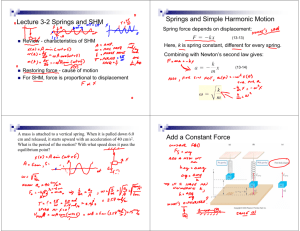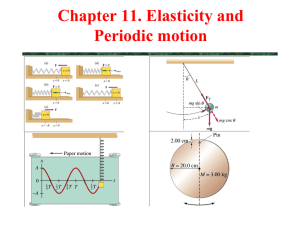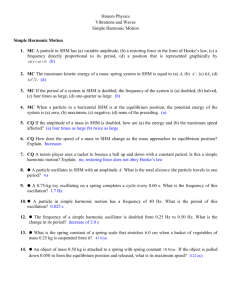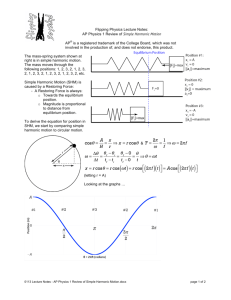Simple Harmonic Motion
advertisement
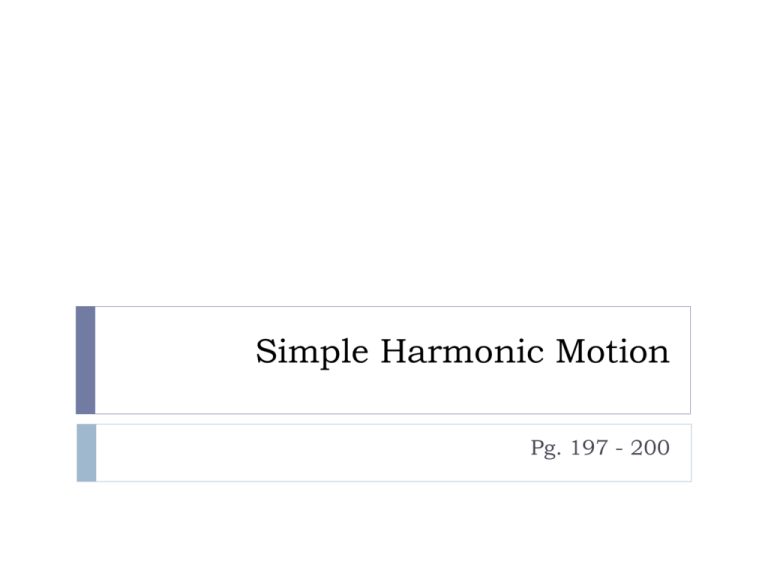
Simple Harmonic Motion Pg. 197 - 200 Restoring Force & Periodic Motion When a spring is extended or compressed, the restoring force either pulls or pushes it back toward its equilibrium position As such, this type of force makes it possible for a spring to undergo a back-and-forth, or oscillating, motion called periodic motion And if the restoring force obeys Hooke’s law precisely, the periodic motion is called simple harmonic motion (SHM) Restoring Force & Periodic Motion Periodic motion is closely associated with wave motion – recall that a vibrating or oscillating object often creates a wave You can make the comparison by imagining a pen attached to the end of a spring that is extended and then released If the pen is allowed to rest on a long sheet of paper that is pulled at a steady rate while the pen oscillates, an image like the one below would be created Restoring Force & Periodic Motion Periodic (or nearly periodic) motion is seen everywhere Playground swings and teeter-totters exhibit periodic motion Sound waves, water waves, and earthquakes involve periodic motion The electromagnetic spectrum from the radio waves that carry signals to our radios and television, to the gamma radiation emitted from radioactive materials, all embody period motion Simple Harmonic Motion (SHM) Periodic motion in which the acceleration of the moving object is proportional to its displacement Recall that F = k∆x Practice 1. A guitar string is vibrating horizontally, as shown. It vibrates between positions A and B, passing through the equilibrium or rest position C. In which positions is the sting vibrating with following? A) Greatest speed? Least? B) Greatest acceleration? Least? C) greatest kinetic energy D) greatest elastic potential energy Simple Harmonic Motion (SHM) When describing SHM mathematically, picture a reference circle, like the CD shown The mass attached to the spring in the figure vibrates left and right with SHM At the same time, the point shown on the CD rotates with uniform circular motion SHM If the amplitude of the SHM equals the CD point’s radius of revolution and the period of vibration for the SHM exactly equals the period of rotation for the CD then and equation of the period of a mass on a spring can be derived (see pg. 198 if interested) note Simple Harmonic Motion (SHM) Periodic motion in which the acceleration of the moving object is proportional to its displacement Practice 2. A car mounted on the springs in its suspension act like a mass on a spring. If passengers are added to the car, will the frequency of oscillation increase, decrease, or stay the same? Explain. 3. Suppose a diver of mass 85 kg stands on a diving board with spring constant 8100 N/m. If we ignore the mass of the board, what is the (i) period and (ii) frequency at which the board vibrates? (T = 0.64 s, f = 1.6 Hz) 4. A mass-spring system undergoes SHM. The elastic potential energy at maximum stretch is 7.5 J, the mass is 0.20 kg, and the spring constant is 240 N/m. Calculate the (i) freqency and (ii) amplitude of oscillation. (f = 5.5 Hz; amp = x = 25 cm) Perpetual Motion An ideal spring would never lose energy and would continue with SHM forever, or as long as you did not disturb it. A machine that can continue to operate for an unlimited amount of time without outside help is a perpetual motion machine A grandfather clock, for example. Is not a perpetual motion machine, since you must wind it up every now and then …….is a perpetual motion machine possible?? Perpetual Motion Currently, it is thought that a perpetual motion machine is NOT possible In real-world machines, some mechanical energy will always be lost from the system as thermal energy, sound energy, or other forms of energy Or is it? http://www.youtube.com/watch?v=tlx2PgESXhs http://www.youtube.com/watch?v=287qd4uI7-E note Perpetual Motion Machine Machine that can continue forever without restarting/refueling Impossible since some energy will always be lost from the system Damping & Harmonic Motion In many practical situations involving a mass-spring system, it would be a disadvantage to have SHM For example, if you were step onto a bathroom scale you would not want the spring in the scale to undergo SHM You would expect the spring to settle down quickly and come to rest so you could observe the reading This “settling down”, due to friction in the system, is called damping Damping & Harmonic Motion A bathroom scale is one example of a device specifically designed for damping. Another example is the system of springs and shock absorbers in a car When a wheel goes over a bump in the road, the wheel’s spring and shock absorbers are compressed easily, but are designed to quickly stop bouncing up and down The energy given to the spring and shock absorber is dissipated, or transformed into other types of energy note Damping & Harmonic Motion Damped harmonic motion is periodic or repeated motion in which the amplitude of vibration, and thus energy, decreases with time Damping: friction that reduces the amplitude or energy of SHM Loss of energy can be useful: Bathroom scale Shock absorbers in cars Practice 5. Are shock absorbers in cars overdamped, critically damped, or underdamped? Textbook page 200,, #6, 9, 10
